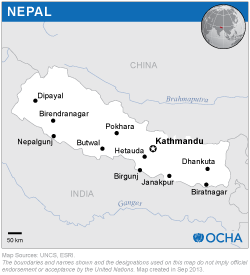ICIMOD has been inducted as the 14th Regional Support Office (RSO) for UN-SPIDER. A Memorandum of Understanding to this effect was signed with the United Nations Office for Outer Space Affairs (UNOOSA) on the sidelines of the 4th RSO Meeting in Vienna, Austria on 11 and 12 February 2013. The UN-SPIDER RSO will be housed in ICIMOD’s Geospatial Solutions Theme (formerly MENRIS), which promotes the use of spaced-based information and GIS for sustainable development to improve the lives and livelihoods of mountain women and men in the Hindu Kush Himalayan region.
ICIMOD employs nearly 170 staff. Within the main thematic disciplines – Livelihoods, Geospatial Solutions, Ecosystem Services, and Water and Air – are housed specialists with range of mountain-relevant expertise including economists, sociologists, anthropologists, statisticians, high value product specialists, gender specialists, governance specialists, climate change specialists, disaster risk reduction specialists, hydrologists, glaciologists, water resources specialists, watershed management specialists, atmospheric scientists, rangeland specialists, ecologists, biodiversity specialists, natural resource management specialists, forestry specialists, GIS and RS specialists, highly specialized software developers, knowledge management and communication specialists, and monitoring and evaluation specialists.
The Geospatial Solutions Theme is a repository for geospatial databases relevant to a wide range of applications including disasters and served through the GeoNetwork. The database includes satellite images, maps, and feature datasets – a total of 4,852 to date.
The International Centre for Integrated Mountain Development (ICIMOD) is a regional intergovernmental learning and knowledge sharing centre serving the eight regional member countries of the Hindu Kush Himalayan (HKH) region – Afghanistan, Bangladesh, Bhutan, China, India, Myanmar, Nepal, and Pakistan. Mountains are important global ecosystems facing especially rapid socioeconomic and environmental changes, particularly the impacts of climate change. Our aim is to influence policy and practices to meet the associated challenges emerging in the HKH region. To do this we bring together top researchers from the region and around the globe to generate and disseminate state-of-the-art knowledge in the physical and social sciences, including traditional knowledge, for evidence-based decision making; and we provide a neutral meeting point for transboundary research, knowledge sharing, and collaboration. Working to deliver impacts in five Regional Programmes across four Thematic Areas – Water and Air; Ecosystem Management; Livelihoods; and Geospatial Solutions – and supported by integrated knowledge management, we seek to improve the lives and livelihoods of mountain women and men, now and for the future.

